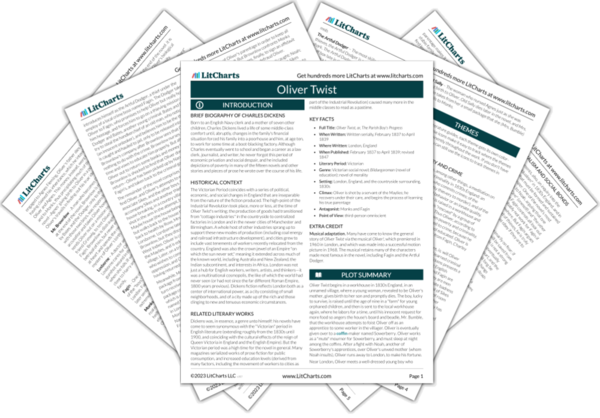Summary
Analysis
Brownlow takes Oliver with him back to his house near Pentonville, a nice neighborhood of London (the bookseller, no longer mentioned, is presumably dropped off). Oliver lies in bed and is tended to by the servants at Brownlow's house; Oliver is in bad condition, and lies "insensate" for many days with fever.
The first of Oliver's spells in bed. Oliver will have another when he is taken in by the Maylies, after the bungled robbery. In those who are good, Oliver seems to inspire even more goodness.
Themes
Oliver finally awakes, after several days, to find himself still in Brownlow's house, being looked after by an old woman named Mrs. Bedwin. When Mrs. Bedwin exclaims to herself that Oliver is a sweet young boy, and that his mother should see him lying as he is now, Oliver remarks that he feels his mother has been watching over him as he has been ill in bed. This causes Mrs. Bedwin to shed a few sympathetic tears.
An important instance of foreshadowing. Oliver feels his mother's presence in Brownlow's house—and it turns out that his mother's presence is there. Brownlow was given a picture of Agnes by Edward Leeford, on that man's last trip from England to continental Europe. Thus, ironically, Oliver is correct in believing his mother is near.
Themes
A doctor visits and corroborates the fact that Oliver is on the mend. Oliver spends several ensuing nights lying quietly in bed, and prays to God for his speedy recovery when he is alone, as he feels that death is "nearby." Oliver eventually feels strong enough to sit in an easy chair in a parlor of the house, and when he does so he spots a portrait on the wall of a young woman, one he finds beautiful and mysterious. But Mrs. Bedwin fears the picture is causing Oliver to grow agitated in his still-present illness, so she turns his chair to face another direction.
The second important recognition. Oliver is very much attracted to the picture of the woman he sees—a woman he does not know to be his mother. He simply finds her radiant, beatific. It is perhaps hard to imagine that Oliver wouldn't suspect a family resemblance between himself and this woman, but that disbelief must be suspended in order for the scene to have its intended emotional effect.
Themes
Literary Devices
Brownlow enters the parlor soon after to see Oliver; when he does so, he cannot help holding back a few tears, which he attributes, in front of Mrs. Bedwin, to some kind of cold. Brownlow refers to Oliver as Tom White, and when Oliver corrects Brownlow, telling him his real name, Brownlow wonders why Oliver told the magistrate differently—Oliver explains that he never told the magistrate anything (because he was too weak to speak), and Brownlow, though puzzled, takes Oliver at his word.
Oliver has been forced into a difficult position—the guard who claimed Oliver's name was Tom was doing so because Oliver was incapable of speech at that moment; but this seems, to Brownlow, at first, like another possible lie from Oliver. Although Brownlow is inclined to believe the boy, Oliver is nevertheless, through bad luck, put into situations in which it appears he is lying.
Themes
Get the entire Oliver Twist LitChart as a printable PDF.

Then Brownlow immediately notices the likeness between Oliver and the woman in the picture, the one with which Oliver was fascinated. As Brownlow points out this coincidence, Oliver faints in his easy chair. The narrator takes advantage of Oliver's faint to describe the whereabouts of the Dodger, Bates, and Fagin.
The Dodger and Bates have slipped away from the scene of the crime, and once they are clear of the crowd, Bates begins laughing at Oliver's face when he was taken—Bates finds the incident only funny—while the Dodger worries what Fagin will say, now that Oliver has been nabbed by the police. Bates and the Dodger realize they cannot avoid Fagin much longer, so they head back to the house, where Fagin recognizes at once that only two of them have returned from the day's escapade.
The Dodger and Bates have differing attitudes regarding their escape. Although both are happy to be free, Bates seems only to enjoy the raucous fun of leaving Oliver to take the blame; the Dodger, on the other hand, appears to have small pangs of remorse for their deed, and the Dodger worries that Fagin will be upset with them, when they return to the flophouse.
Themes












